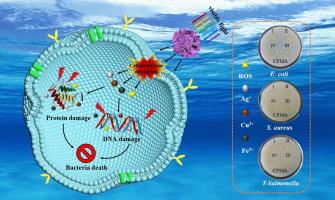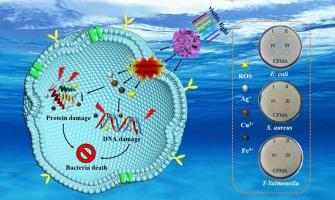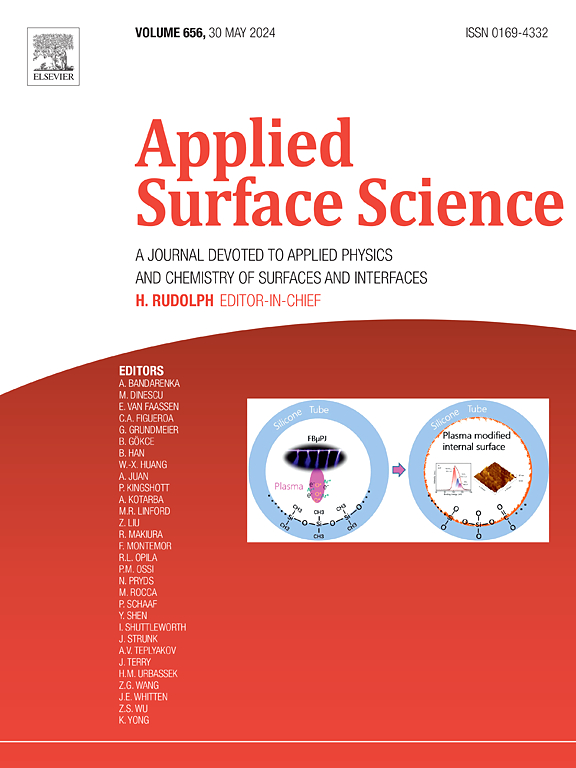Synthesis and potent antibacterial activity of nano-CuFe2O4/MoS2@Ag composite under visible light
IF 6.3
2区 材料科学
Q2 CHEMISTRY, PHYSICAL
引用次数: 0
Abstract
With antibiotic resistance on the rise due to misuse, the urgent need for new antibacterial materials has become paramount in global health. Herein, a CuFe2O4/MoS2 (CFM) composite with a large specific surface area was synthesized through a simple hydrothermal method and physical adsorption, and the subsequent loading of silver nanoparticles (Ag NPs) onto its surface yielded the nanocomposite CuFe2O4/MoS2@Ag (CFMA) with a rough defect-rich surface. The nanocomposite demonstrates remarkable antibacterial activity against Escherichia coli, Staphylococcus aureus, and drug-resistant Salmonella (T-Salmonella) by releasing metal ions that alter the electrical potential of bacterial cell membranes, compromise the integrity of cell membranes, and produce reactive oxygen species that lead to oxidative stress. It thus achieves an antibacterial rate of 96 % against the three tested bacterial strains within just 20 min at a concentration of 200 μg/mL. The composite exhibits a broad-spectrum antibacterial effect against Gram-negative and Gram-positive bacteria, as well as drug-resistant bacteria. Moreover, CFM acts as a carrier that effectively prevents the aggregation of Ag NPs, and the magnetism of CuFe2O4 facilitates the recovery of the antibacterial agent. This work provides new ideas and methods for the development of highly efficient, cost-effective, and biocompatible antibacterial materials.


纳米 CuFe2O4/MoS2@Ag 复合材料的合成及其在可见光下的强效抗菌活性
随着抗生素滥用导致的抗药性不断增加,全球健康领域迫切需要新型抗菌材料。本文通过简单的水热法和物理吸附法合成了比表面积较大的CuFe2O4/MoS2(CFM)复合材料,随后在其表面负载银纳米粒子(Ag NPs),得到了表面粗糙缺陷丰富的纳米复合材料CuFe2O4/MoS2@Ag(CFMA)。这种纳米复合材料对大肠杆菌、金黄色葡萄球菌和耐药沙门氏菌(T-Salmonella)具有显著的抗菌活性,它释放的金属离子能改变细菌细胞膜的电位,破坏细胞膜的完整性,并产生导致氧化应激的活性氧。因此,在 200 微克/毫升的浓度下,它能在短短 20 分钟内对三种受测细菌菌株产生 96% 的抗菌率。这种复合材料对革兰氏阴性菌、革兰氏阳性菌以及耐药菌具有广谱抗菌效果。此外,CFM 作为载体可有效防止 Ag NPs 的聚集,而 CuFe2O4 的磁性则有利于抗菌剂的回收。这项研究为开发高效、经济、生物兼容的抗菌材料提供了新的思路和方法。
本文章由计算机程序翻译,如有差异,请以英文原文为准。
求助全文
约1分钟内获得全文
求助全文
来源期刊

Applied Surface Science
工程技术-材料科学:膜
CiteScore
12.50
自引率
7.50%
发文量
3393
审稿时长
67 days
期刊介绍:
Applied Surface Science covers topics contributing to a better understanding of surfaces, interfaces, nanostructures and their applications. The journal is concerned with scientific research on the atomic and molecular level of material properties determined with specific surface analytical techniques and/or computational methods, as well as the processing of such structures.
 求助内容:
求助内容: 应助结果提醒方式:
应助结果提醒方式:


